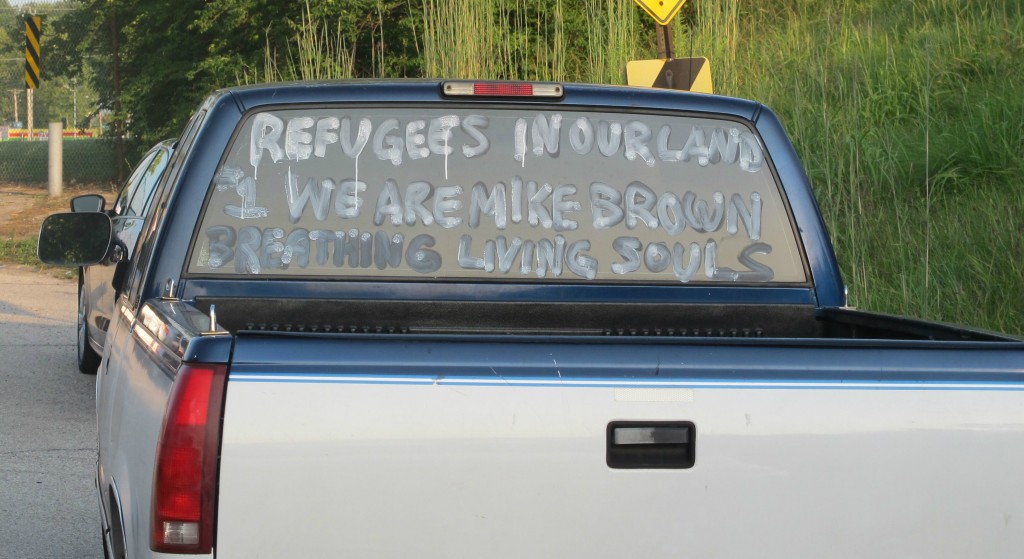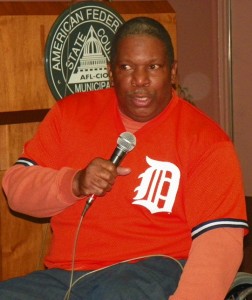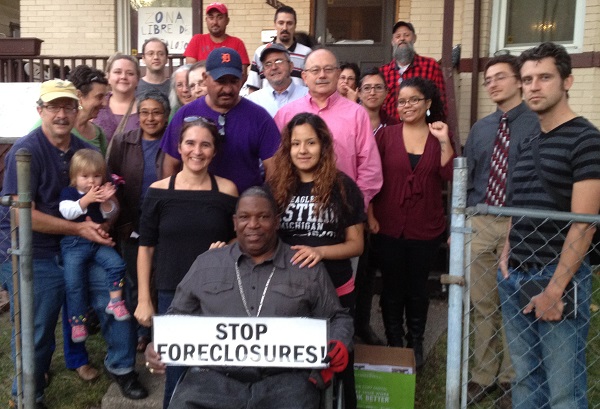A MESSAGE FROM UPS WORKERS
Sisters and Brothers:
We are a group of workers at the UPS distribution center in Northeast Minneapolis. Like many such jobs, the pay is low and the conditions terrible. The workers at our facility are a diverse group of young people, many of whom are attempting to pay our ways through community or tech colleges. Each day, we sort through and load through thousands of packages into trucks so they can get to their destinations across the country and UPS can make its billions. On last Friday, some of us made an exception… Early last week, we looked into one of the companies which ships through our facility, a company called Law Enforcement Targets, Inc. This company ships shooting range targets to police departments and federal agencies nationwide, and we discovered it was shipping to cops all around Ferguson. They sell product lines like “Urban Street Violence” and “No More Hesitation”. They have photos of sterotypical “thugs,” as well as pictures of gun-wielding children, pregnant women, mothers, and elderly people, all as if to say that you should consider everyone you see as a threat to be gunned down. So, last Friday, a small group of about a dozen workers, both workers of color and white workers, started to stand up to our work contributing to the ongoing violence against the people of Ferguson and the police murder of young black people like Michael Brown. When Law Enforcement Targets packages came into trailers, loaders would remove them and place them outside. When they came across our conveyor belts, sorters would refuse to correctly sort them. When managers asked workers to put the packages into the right truck, they would conveniently find more important tasks to take care of first. We posed outside our building with signs reading “Hands Up Don’t Ship.”
 This was simply a start, and most of the packages were placed by supervisors int
This was simply a start, and most of the packages were placed by supervisors int
o the trucks later. But it is growing. Right now, as this statement is being read, we are at work, continuing with this, and each day more people at work are learning of the action and deciding to join us. We want to put forward a simple idea: we shouldn’t be forced to contribute to racism, brutality, or murder in order to pay our rent.
What if every time the cops brutalized black and brown communities, no one would send them ammo? What if no one would fix their patrol cars? What if their laundry service refused to wash the stench off their uniforms? What if every time they tried to close down a school in a poor neighborhood, janitors at city hall refused to show up to work? What if we stopped having to check our conscience at the door when we clock in?
We’re a far way away from that, and we know it. But we want you to know that you have more power than you think. It’s not just us, people working all sorts of jobs can take on these awful systems if we get organized. For us, we’ve done this through the Industrial Workers of the World, and we know that some of our comrades from the IWW are here today and would be happy to put anyone in touch with us. For you, it may be something different. Whatever it is, we urge you to find ways that we can all stand up to oppression as working people and stop the systems that keep people down. We’ll be there to support you so we can all stand taller together against the violence and brutality.
SOLIDARITY!
by an M1 Chicago Member

On Tuesday, August 19, my wife and I decided (more or less spontaneously) to drive down to Ferguson from Chicago. As politically engaged people in general, and as white people parenting a black son in particular, we were both enraged by the murder of Michael Brown and inspired by the continuing struggles of the people of Ferguson.
We wanted to see with our own eyes what was really going on and to act as witnesses to a historical moment of repression and resistance. The goal, to the extent that we had one, was educational, for us, for our children, and for our friends and comrades unable to be there in person. Apart from what we had read on the internet, we had two other sources of on-the-ground information: I had been in touch that day with an older revolutionary already in Ferguson, while my wife had touched base with a younger friend/comrade who had been in Ferguson earlier doing legal observing and trainings. Both of them told us to be careful, but encouraged us to go.
We didn’t get on the road until about 1pm so we arrived at what people have been calling “ground zero” (the intersection of W. Florissant and Ferguson Road) around 6pm. Not knowing exactly what to expect in terms of either crowd or police behavior, we parked a couple blocks away and walked in, carrying supplies for ourselves and a 32 pack of water bottles to share with people in the crowd, which we successfully distributed within minutes of arrival. Whatever else people “on the ground” want or need, water is always appreciated.
 Apart from one person who yelled at us to go home, every other person we met in the course of three hours walking along Florissant welcomed us, although several repeated the injunction to be careful, and a few checked just to make sure we had contingency plans in place in case things got crazy (we did). It was clear from the moment we arrived to the moment we left that the only hostile and dangerous element of being there was the police presence.
Apart from one person who yelled at us to go home, every other person we met in the course of three hours walking along Florissant welcomed us, although several repeated the injunction to be careful, and a few checked just to make sure we had contingency plans in place in case things got crazy (we did). It was clear from the moment we arrived to the moment we left that the only hostile and dangerous element of being there was the police presence.
If I could summarize the experience of being on that street on Tuesday evening in a single phrase, it would be “diversity of tactics.” For anyone unfamiliar with the term, it gained currency in the run-up to protests against the Free Trade Area of the Americas summit in Quebec City in 2001, when local anarchists and their supporters tried to bridge the growing tactical disagreement within the then-vibrant anti-globalization/globalization-from-below movement around questions of “peaceful” and “militant” protest. While many of us on the “militant” side of the debate back then found the concept of agreeing to disagree about protest tactics to be appealing, it was not generally welcomed by a lot of the more mainstream protesters and especially organizational participants like unions, etc. So, at least at its inception, diversity of tactics remained more a theory than a practical reality.
By contrast, our brief visit to Ferguson seemed to me to reflect a lived reality of diversity of tactics. This is not to say that everyone simply agreed to disagree; the reports of sharp disputes among the crowd about things like fighting the cops, prayer as the solution to everything, legality and illegality, etc. – all were quite clearly in evidence when we were there. But they played out in meaningful debates among participants in a common struggle, rather than angry or condescending refusals to engage with the other side. For instance, I watched a fascinating encounter between two older (60-ish) black men. One, dressed in a t-shirt and jeans, approached the other, dressed in a clergy’s collar, and asked if he thought prayer was the solution. The clergy responded that he did, and the guy in the t-shirt then tried to convince him that he was wrong, and that if people didn’t fight back they would end up beaten down even more. “If this [the looting/street fighting] hadn’t have happened,” he asked, “would the world have took notice of what was happening here?”
Neither of these guys seemed like they were interested in fighting the cops themselves, but both were openly discussing the pros and cons of the tactic, in the middle of a fairly crowded sidewalk where dozens of similar discussions were happening all around them. Watching them, I suddenly thought of the Ken Loach movie Land and Freedom, which has an amazing scene of Spanish peasants arguing about the proper approach to collectivization during the Civil War. (There is also a similar scene in his movie The Wind That Shakes the Barley, about the tactical and strategic orientation of the Irish independence struggle.) The idea that people’s collective consciousness shifts rapidly in the course of intense struggle can sometimes seem abstract, but here it was on full display for anyone to see.
Continue Reading…
 Members of the Detroit branch of First of May Anarchist Alliance recently co-hosted a reading group for the book, Captive Genders: Transembodiment and the Prison Industrial Complex.
Members of the Detroit branch of First of May Anarchist Alliance recently co-hosted a reading group for the book, Captive Genders: Transembodiment and the Prison Industrial Complex.
We wanted to post the notes and review one of our members, Miriam, made and presented during that discussion.
Our book for discussion today, Captive Genders, [Stanley, Eric A. & Smith, Nat, Editors. Captive Genders: Trans Embodiment and the Prison Industrial Complex. AK Press, 2011] begins with a recounting of the Stonewall fight back. This highlights the fact that our theory must be rooted in action. It is responsible for helping us understand our actions and for pushing our action forward, as far as we can go. What I want out of this discussion is a deeper understanding of how we are confined by capitalist narrative, in terms of who we are, how we identify ourselves and our potential. We are limited by how the system magnifies its own power, so that we become afraid to challenge it. I want us to deepen our understanding of self defense as more than individual fight back; our movement is a form of self defense; the revolution itself is self defense. I want us to deepen our support and practice of self defense. I want us to promote self defense and defend those who practice it. I want us to develop networks so that we can move quickly and effectively. No one should have to fight alone, although many of us do, out of necessity. In this, as in many other situations, we cannot rely on other forces; we have to defend ourselves.
The people highlighted in our book, as well as the people coming into our movement, already practice self defense. It is in the nature of the attacks they face, that they have to fight for their own survival. One job of our movement is to help unify and coordinate this fight back, so that we grow stronger. We look to increase awareness, and to build a framework within which people can see themselves as part of the movement, as Vanguard (a San Francisco – based gay organization in the 1960s) did by placing ads in their newspaper requesting people to come forward with their stories of police harassment. (52) Mutual solidarity and defense, along with coalition building, are important facets of our movement.
Continue Reading…



Jerome Jackson Remembered (view PDF, here)
By First of May Anarchist Alliance – Detroit Branch
Jerome Jackson, our good friend and a fighter for justice, died on Sunday, May 11, 2014. Jerome, in recent months, had been battling cancer, but his death is untimely and came much too soon. Jerome died at his home in Inkster, Michigan, a home he had battled to save for the past five years.
Jerome had been shot in the back at age 14 in 1969, and the shooting left him a paraplegic and confined to a wheelchair. But Jerome’s spirit and his determination to fight against injustice were never confined. He became a leading fighter for the rights of persons with disabilities and was an active and leading member of Detroit Eviction Defense. Jerome lived independently and with dignity at his home in Inkster for the past ten years.
Continue Reading…
Comrades,
This is an interesting interview with our comrade Miriam (M1 Detroit) on her history of “Industrialization” with her organization at the time the Revolutionary Socialist League. “Industrialization” was the term that the Left used to describe the strategy of getting mainly University and counter-culture youth activists to commit to point-of-production organizing in factories as part of the working-class. It was different than what is today known as “salting” – as “Industrialization” was not usually seen as a short-term stint around a specific campaign, but rather a long-term commitment to building a revolutionary presence in the class.
The organized entrance of a few hundred revolutionaries into the industrial working-class was one of the factors (along with the Black Power consciousness, returning Vietnam vets, and the broad influence of the counter-culture) in the upsurge in radical struggle in the workplace. In some sections of the Left “Industrialization” was encouraged in a top-down, authoritarian manner. Many New Left-era activists who “Industrialized” did end up leaving working-class jobs for academia and the professions after some time spent in the factories. Others eventually made home for themselves within the Union bureaucracy and left radical politics behind.
Miriam agrees that this interview can be posted widely, in order to share lessons and spark discussion. She adds:
“If we had had an anarchist understanding of bottom up organizing, incorporating community work we could maybe have gotten farther. Lessons indeed!”
Solidarity,
Kieran
Preliminary Interview Questions:
*Did you industrialize as part of an organization or a group?
Miriam: Yes, as part of the Revolutionary Socialist League.
[Note: The RSL was an unusual Trotskyist group that over time criticized and abandoned first orthodox Trotskyism, then Leninism, and began questioning Marx. The RSL dissolved in 1989 with several former members helping found the anarchist network Love & Rage. -K]
*If as a group, when did your group begin sending comrades into industry? Why did you all take this “turn” to industry, so to speak?
M: The Detroit branch of the Revolutionary Socialist League began industrializing in 1974-75. We felt it imperative to get work in the auto factories, work alongside, get to know and recruit auto workers to the revolutionary cause.
*Which industries did you and your comrades target in particular, and why? Was there any discussion about service or agricultural labor?
M: The auto industry was targeted in Detroit. We also had cadre in the post office. The Chicago branch had workers in steel and auto. The New York branch had people in auto and the post office. We were looking for the larger unions, where we could possibly have a national impact. We looked for a diverse workforce.
*Why did you personally decide to industrialize? Was this a personal choice or did your group direct its members into industrialization?
M: I was asked if I wanted to move to the Midwest and go to work in the factory. I was in my early 20s, needed work and thought this could work for me.
*Where did you industrialize? Why? Was this also your choice?
M: When I moved to Detroit in 1975, I first got a job at the post office. I was hired as an NTE (not to exceed 89 days) and rehired on that basis 3 times. We were not allowed to participate in the union. I attempted to go to union meetings and did a little agitation around that. When I was called for an interview at General Motors, I made that move and began work at GM in 1976. I was 26 years old, one of very few women in the plant, one of even fewer Jews, a closeted lesbian.
*What were your objectives, both short term and long term, in industrializing?
M: My first objective was to make a life for myself, a secure job, friends, a safe place to live. Within that we needed a revolution to change the way the system works, and I saw it as my job to talk that idea up, to convince people we were right and to join with us, in their own interests.
Continue Reading…
 The following is a review of the new book , The Tyranny of Theory: A Contribution to the Anarchist Critique of Marxism. The review by Wayne Price first appeared on the Anarkismo.net site. Ron Tabor is a member of the Utopian Journal and of First of May Anarchist Alliance. The book has been published by Black Cat Press in Edmonton, Alberta, Canada.
The following is a review of the new book , The Tyranny of Theory: A Contribution to the Anarchist Critique of Marxism. The review by Wayne Price first appeared on the Anarkismo.net site. Ron Tabor is a member of the Utopian Journal and of First of May Anarchist Alliance. The book has been published by Black Cat Press in Edmonton, Alberta, Canada.
Review of Ronald D. Tabor, The Tyranny of Theory: A Contribution to the Anarchist Critique of Marxism (2013). 349 pages.
By Wayne Price
There is a paradox to Marxism, a central contradiction. Like anarchism, it originated in the 19th century movements for democracy, socialism, and working class liberation. Its stated goals were the end of capitalism, of classes, of the state, and of all other oppressions. Hundreds of millions of workers, peasants, and others have mobilized under its program, aiming for a better world.
But what was the result? The first Marxist movement resulted in the social-democratic parties of Europe and elsewhere. These ended up supporting capitalism and opposing revolutions. They supported the existing state, bourgeois democracy, and Western imperialism and its wars. Currently they have abandoned all pretense of advocating a new social system.
Lenin, Trotsky, and others sought to return to revolutionary Marxism. Their activities resulted in “Stalinism”: a series of monstrous, state capitalist, tyrannies, which killed millions of workers and peasants (and thousands of Communists). Currently these have collapsed into traditional capitalism.
How did Marxism start off so well and end so badly? No doubt there have been “objective forces,” as the capitalist system pressures and distorts even the most liberatory doctrine. But isn’t this to be expected under capitalism? Which aspects of Marxism made it most vulnerable to these pressures? What was there in the original Marxism of Marx and Engels which lent itself to these terrible results? Continue Reading…
Chile has a long history of working class struggle in shanty towns, factories, mines, community organizations, and schools. In the 20 years after the US supported coup which overthrew Salvador Allende’s government, much of the organizing was done underground. However after the fall of the dictatorship in 1990, there was a new rise of mass popular organization in the country. Anarchists have been a major force in the social movements, strategically organizing to build power. This has manifested in solidarity for the Mapuches, anarchists winning the student union elections at the University of Chile, militant pro-abortion actions, and libertarian labor organizations.
This national tour brings three individuals involved in these struggles to talk about the lessons learned and to create solidarity across hemispheres. From January to the end of February, the speakers will be traveling throughout the country and we hope that you can spread the word and hear about the important work that is happening in Chile.
 This project has been endorsed by the First of May Anarchist Alliance. Late last year we published a discussion document on the revolution and war in Syria.
This project has been endorsed by the First of May Anarchist Alliance. Late last year we published a discussion document on the revolution and war in Syria.
About
The MENA Solidarity Network-US promotes awareness of, and support for, the ongoing wave of mass revolutionary struggles in the Middle East and North Africa–popularly known as the Arab Revolutions.
Description
The MENA Solidarity Network-US promotes awareness of, and support for, the ongoing wave of mass revolutionary struggles in the Middle East and North Africa-popularly known as the Arab Revolutions.
We were founded by groups and individuals from the left and workers’ movements who recognized the need to oppose Western imperialist threats to attack Syria while also continuing to defend Syria’s popular revolution against the Assad dictatorship and its allies. We thus oppose all forms of imperialist intervention in the region while supporting popular struggles against all who would deny democratic rights or enforce economic exploitation. By the same token, we oppose all forms of Zionist expropriation of land and resources, apartheid and repression, while supporting Palestinian refugees’ right of return.
We are committed to the principle of international solidarity from below, which supports the struggles of the oppressed against their oppressors in all of Tunisia, Egypt, Libya, Yemen, Palestine, Syria, Bahrain, and other countries. We cannot, as people of conscience, ignore the call for “Freedom, Dignity, and Social Justice” coming from revolutionaries throughout the region.
We defend the rights of all people to practice, or not practice, any religious faith of their choosing. Based in the United States, we see a particular responsibility to defend Muslims from Islamophobic vilification and discrimination.
We highlight and applaud the role of women in the revolutions, and support their full rights and equal participation in society and in the revolutionary process.
And we pay particular attention to the struggles of workers and poor people, defending their rights and drawing attention to their struggles.
We call upon all groups and people who agree with us to sign onto our statement and join our network to oppose US intervention and help build solidarity with our brothers and sisters struggling for freedom and justice in the Middle East and North Africa.
https://www.facebook.com/MENASolidarityUS/info
https://menasolnetus.wordpress.com/
by First of May Anarchist Alliance – Minnesota Collective
November 2013
Download PDF file here

Socialist and Democrat campaign signs compliment each other in Minneapolis
I.
All across the Central, Corcoran, Phillips, and Powderhorn neighborhoods of Minneapolis you can see the red & white “Ty Moore for City Council” yard signs, symbolic of the impressive effort the campaign is mounting. The Campaign literature emphasizes social justice, in particular the ongoing movement to defend homeowners from foreclosure and eviction. The Green Party (Minneapolis’ 2nd party) and, significantly, the SEIU union leadership have endorsed Ty’s campaign – signaling an apparent challenge to Democratic-Farmer-Labor rule in Minneapolis. What could be wrong with all of this?
Plenty, actually. Electoral campaigns, including this one, have as their aim to get “our guy” into a place of power – the government – and to “educate” the public on issues of importance. But what kind of power is this? And what are people being taught?
II.
The government is not a democratic institution. It is bureaucracy in the shape of a pyramid with more power and fewer people the higher you climb. “The State”, as anarchists call the government – including City Hall – is a system imposed over the people and land in which self-determination is “taken from the people and confided to certain individuals, and these, whether by usurpation or delegation, are invested with the right to make laws over and for all, and to constrain the public to respect them, making use of the collective force of the community to this end.” (Malatesta, an old-school Italian anarchist)
The State overlaps with and is usually subordinate to the economic hierarchy of the super-rich, their corporations and banks – what the Occupy movement called “the 1%” and what anarchists refer to as “the ruling class”. Together, the ruling class and the State control the system of exploitation, oppression, and alienation – and the resultant wars, low pay, police brutality, sexual harassment, gentrification, environmental destruction, boredom and depression – that dominate our lives.
Prioritizing a campaign for City Council can be seen as akin to saying that workers should focus their energies around getting the right person to be their CEO or on the board of directors.
III.
Historically there have been two ways people have organized to confront this system:
Reform or Revolution. Continue Reading…
October 2013,
Vol. 12

October 2012: Volume 12
The Utopian Content:
Who We Are
Current Affairs
Towards an M1 Policy on Syria…First of May Anarchist Alliance
Dignity Campaign Response to the Senate Immigration Bill S. 744
M1AA Statement on Anti-Gay Violence
Trayvon Martin—A Personal Response…Christopher Z. Hobson
Poetry
Beneath Mount Saint Rosalie—1866…Bob McGlynn
Lift Every Voice and Sing (1900)…James Weldon Johns on Theory and History
“True to Our Native Land”—African Americans and the United States…Christopher Z. Hobson
Totalitarians Come in Many Guises (Review-Essay)…Ron Tabor
Neither East Nor West, NYC—Some History…Bob McGlynn
…………………………………..
The Utopian Publishing Co.
Christopher Z. Hobson
P.O. Box 1355
Bronx, NY 10471
utopian@utopianmag.com
Christopher Z. Hobson, Mary Robinson, Ron Tabor.
$8.00 per single print copy. Send check or money order in U.S. dollars, payable to Christopher Hobson, to the address above. Do not send cash. We cannot accept credit/debit payments

 This was simply a start, and most of the packages were placed by supervisors int
This was simply a start, and most of the packages were placed by supervisors int





 The following is a review of the new book , The Tyranny of Theory: A Contribution to the Anarchist Critique of Marxism. The review by Wayne Price first appeared on the
The following is a review of the new book , The Tyranny of Theory: A Contribution to the Anarchist Critique of Marxism. The review by Wayne Price first appeared on the 


